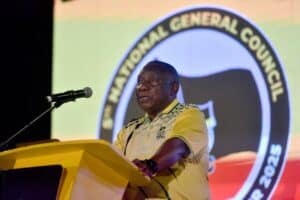If voters don't recognise their power, they might find themselves living in modern versions of the Bantustans.

Last year South Africa’s governing African National Congress (ANC) elected a new leadership, which was the result of a hard-boiled deal between the party’s factions. South Africans can now see how the deal that produced a new governing party leadership last year is meant to work. It may keep the ANC together and is unlikely to worry people in the major cities much. But it could make an already serious inequality problem worse.
The nature of the deal is revealed by events in the North West province where Supra Mahumapelo, an unpopular provincial premier, seems set on remaining in power despite voter rejection and demonstrations calling for his head. He has so far been able to do this because he controls the provincial ANC structures.
The national leadership has placed the province under the administration of central government. But that is more an admission of defeat than a solution. It’s an acknowledgment that central government could not solve the problem politically and so it’s been forced to use administrative measures.
To understand these events, we need to go back to the ANC’s December conference at which its current leadership, with Cyril Ramaphosa as president, was elected. The choice of leaders was the product of a deal that saw the leadership group divided equally between supporters and opponents of former president Jacob Zuma.
It was also a compromise between two types of politics – one which uses the state’s resources for enrichment and patronage and one rooted in the market, which opposes government behaviour that might weaken its ability to create wealth.
The deal
Since the election, the ANC’s national leadership has been behaving largely as if no deal was done and they alone are in charge. It has removed Zuma and has appointed an inquiry into the “state capture” of which his faction is accused. It has also replaced the boards and senior managers of state-owned enterprises that were seen to aid the capture of public resources by connected people.
Ramaphosa’s first cabinet included members of the Zuma faction, but the key positions are held by his group.
This begged an obvious question: what was the pro-Zuma faction getting out of the deal? Why were they falling in line with the anti-state capture agenda that pulled the rug from under them?
North West provides the answer. At the core of the Zuma faction’s campaign, which relied on electing his ex-wife Nkosazana Dlamini-Zuma as president, was the so-called Premier League, provincial premiers in three mainly rural provinces.
Mahumapelo was one, but he did not ascend to national office. The other two, David Mabuza and Ace Magashule, are now deputy president (of both the ANC and the country) and ANC secretary-general, respectively. While there are differences between them – Mabuza struck the deal that got Ramaphosa elected – all three are regional strongmen whose power relies on controlling their provinces.
They seem to have decided not to challenge Ramaphosa’s faction on national issues. But all three are set on retaining their power base in their provinces; Mabuza and Magashule have been replaced by premiers who are likely to defer to them and Mahumapelo is determined to hold on to the North West ANC. They seem to remain strong enough in their provincial ANCs to allow them to do this.
Back to Bantustans
If they succeed, people in the cities will be largely unaffected. The battle against national state capture will continue. But those in rural areas, most of which were Bantustans under apartheid – rural dumping grounds where local power holders controlled residents on behalf of the apartheid state – will remain firmly in the grip of the patronage politics and state capture from which the cities will be at least partly free.
This will not only entrench inequality, it will keep alive the apartheid patterns democracy was meant to end because millions of people in the former Bantustans will remain under the control of leaders who are not interested in serving them. They will be at best partly free and will continue to live in poverty.
Whether this is allowed to happen will depend less on ANC politicians, including Ramaphosa, than on citizens. The ANC national leadership is trying to intervene in North West but it has shown no interest in changing the way Free State and Mpumalanga are governed. It seems to understand the deal to mean that they cannot be touched. If Zuma’s ally Sihle Zikalala wins control of KwaZulu-Natal, he too might gain a free pass to govern that province as he pleases.
The only reason the ANC leadership is intervening in North West is that citizens have made it clear they want Mahumapelo and his style of governance gone. Besides the damaging street demonstrations, the ANC may lose North West to the opposition in next year’s general election.
While it has lost ground at the polls in the other Premier League provinces, the damage is not enough to persuade national leaders they need to do anything about these areas. That would no doubt change if the ANC vote in those provinces also started dipping under 50%.
The ANC deal seems set to condemn people living where apartheid’s Bantustans once reigned to much the same sort of governance as they endured then. But they have a weapon now they lacked then: a vote, which might yet bring them the same freedoms people in the cities enjoy.
Steven Friedman, Professor of Political Studies, University of Johannesburg
This article was originally published on The Conversation. Read the original article.






